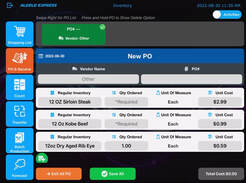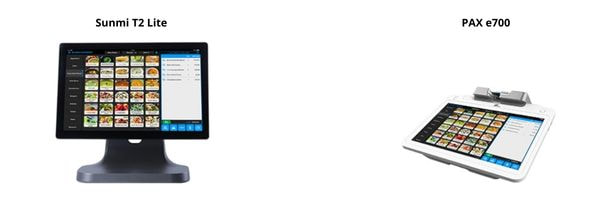3-minute read ---
This October 28, 2022, the PCI Security Standards Council will officially close the Payment Application Data Security Standard (PA-DSS) program. For restaurant owners and credit card merchants, this means finalizing the transition from the PA-DSS program to its successor, the PCI Secure Software Standard. This will enable restaurant owners to continue adhering to PCI Security Standards Council standards in everyday business transactions.
Established by five major credit card companies, the Purchase Card Industry Data Security Standards (PCI DSS) are a set of regulations for all businesses that accept credit cards and continue to be modified as payment processing and data systems evolve. While not legally enforced, adherence to PCI DSS standards is extremely widespread and can result in multiple financial penalties, up to and including denial of credit card processing for merchants who do not comply.
The new PCI Secure Software Standard will continue to support merchants as they work to meet overall PCI DSS compliance. The change will also enable:
Established by five major credit card companies, the Purchase Card Industry Data Security Standards (PCI DSS) are a set of regulations for all businesses that accept credit cards and continue to be modified as payment processing and data systems evolve. While not legally enforced, adherence to PCI DSS standards is extremely widespread and can result in multiple financial penalties, up to and including denial of credit card processing for merchants who do not comply.
The new PCI Secure Software Standard will continue to support merchants as they work to meet overall PCI DSS compliance. The change will also enable:
- "Greater diversity of software that can be assessed than was previously available
- More agility for modern development techniques and release cycles
- Consistency in use of software security across all PCI standards
- Increased transparency of interim software updates
- Increased flexibility and accountability for software vendors in the achievement of PCI software security objectives
- More emphasis on education within software development community on the importance of payment security"
source: https://blog.pcisecuritystandards.org/how-to-successfully-transition-software-from-pa-dss-to-the-pci-secure-software-standard
As merchants strive to meet these new security standards, Aldelo provides support through digital payment tokenization technology for in-store and remote online orders.
Aldelo Pay token-based payments protect merchants and personal customer data by immediately encrypting personal credit card data as soon as a customer’s card is tapped, dipped, or swiped. This applies to all transactions completed via Aldelo Express iPad and Android POS terminals as well as Masa+ digital online storefronts. Each customer’s personal card data is secured by a unique “token” exclusive to the restaurant’s Aldelo Express POS system, credit card processor, and customer’s card. Customer credit card info is never stored or saved by the restaurant or within its point-of-sale system.
Through Aldelo’s native merchant processing services, as well as approved Aldelo Partner merchant services, restaurants of all sizes easily reap the benefits of token-based digital payments. Aldelo Express PCI DSS compliance works for every type of restaurant operation. This includes ghost kitchens that process orders exclusively online, multi-store locations that serve via dine in and delivery services, mobile food truck vendors that accept cash and digital payment services, and more.
Using secure credit card tokenization and Aldelo Express, restaurants enable their staff to pre-authorize credit cards and confirm funds before opening a ticket in bars, outdoor events, and traditional dining room settings. Restaurant staff simply manually enter a given dollar amount against a credit card to confirm available funds in the cardholder’s account before serving customers with security and ease.
Aldelo Express POS tokenization technology keeps customer credit cards secure and “active,” enabling wait staff to make multiple real-time changes to a guest ticket even after an order is closed. This becomes relevant in situations where a charge has been missed, a refund needs to be applied, or a tip needs to be adjusted. Staff simply recall and reopen an order on any Aldelo Express terminal to make a ticket adjustment, keeping customers happy while protecting personal digital payment data.
Learn more about Aldelo Express POS and digital payment security by contacting an Aldelo representative today at [email protected] or 877-639-8767
|
Restaurants that use ultra-competitive Aldelo Pay or Aldelo Partner Merchant Services obtain access to a Centralized Multi-Store Restaurant Technology Platform that includes Masa+ Online Ordering, Unlimited Software Releases, Unlimited Software Upgrades, and 24/7 Technical Support! *** Please contact an Aldelo representative today for more details, including a free Aldelo Express POS demo trial [email protected] | 877-639-8767 | [email protected] |
|
More Like This...
|
Merchants Quickly Identify Profit Leakage and Reduce Waste
Using the Aldelo Express POS Inventory Module 3-minute read ---
After labor, the best way for restaurant owners to control their costs is by managing their inventory purchasing cycles. Regular item counts not only provide owners and operators a clear picture of their usage cycles and associated revenues, but also are essential to effectively cutting costs, validating purchases, maximizing inventory yields, and identifying profit leakage occurring at one or multiple restaurant locations. |
Aldelo Express Includes 15” Sunmi Android Terminal Option
Modern Cloud-Based Platform Also Supports PAX e700 Integrated POS System 3-minute read ---
Compared to the restaurant industry 50 years ago, modern restaurant operations are nearly unrecognizable. Then customers dined at restaurants in-person, paid with cash, and met with a cashier at the front cash register to pay for their meal. Today, modern restaurants operate beyond the store’s four walls at homes, offices, event venues, or local public gathering places to deliver food and drinks placed online with integrated QR code-based online ordering and digital payment integrations. |


